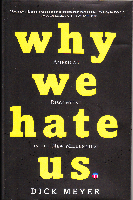
Why We Hate Us: American Discontent in the New Millennium
by Dick Meyer
Dick Meyer doesn’t leave the easy targets be.
He describes hipsters as hanging out “at a trendy, anti-trendy club wearing a vintage gas station shirt and orders Pabst Blue Ribbon because he’s trying to look working-class and cool at the same time.” He says of Tila Tequila’s reality show: “It’s bisexual exploitation. What a wonderful social breakthrough.” On an issue of Martha Stewart’s Real Simple magazine that recommended using a six-pack container to transport picnic supplies from kitchen to patio: “It would be wrong to transport utensils in a way that wasn’t so cute. And it would be wrong not to maximize that cute microbrewery six-pack.”
The “aspirational” magazine, and so much else in our culture, Meyer argues, confuses choice with freedom, and the making of choices with the making of a self. This is bigger than the collective groan it elicits. It is part of why we hate us, Meyer says. It is the opposite of what early Americans had in mind when they embraced the ideal of the self-made man. “When you use a ring tone to help define yourself,” Meyer writes, “you’re in trouble.” (Though this glass-house-dweller with the semi-ironic, fake-nostalgic old-fashioned phone ring isn’t throwing stones.)
Meyer tallies up his easy targets – the sort of daily irks that are constantly dissected in a vast literature of pique – to get at something bigger, the underlying ills of modern America: “omnimedia” and “omnimarketing,” the dissolution of morals and manners for relativism and relentless self-expression, a politics that is mostly about appearances. Meyer cites most of his scolding predecessors, including E.J. Dionne, Joe Klein, Judith “Miss Manners” Martin, Robert Pirsig, Lionel Trilling, and Robert Putnam, among others as disparate as Soren Kierkegaard and the Black Eyed Peas (whose “My Humps” embodies most of what’s wrong with America).
What keeps Meyer’s book from veering toward the hateful itself is its acknowledgment that we all do our part to keep the culture going, including the author, a card-carrying member of that most hateful creature, the MSM. We buy the tabloids, we leave the awful blog comments, we walk around with headphones in our ears. Why We Hate Us admits a collective fault, finds a solution, and manages to avoid ranting or self-righteousness, the main tones of so much of our communication.
The book’s subject matter would be depressing for readers at worst and annoying at best without a glimmer of hope. As Meyer admits, he is “more comfortable carping than preaching so answers don’t come easily.” Still, he offers two: to build community and to have a “moral temperament,” or, more particularly, to be pluralistic without succumbing to relativism.
Excerpt: “The ‘hate’ we need to understand is not the bomb-throwing kind of hate. It’s not the diseased paranoia of Timothy McVeigh, the Weather Underground, or the Unabomber. It is a mood of social self-loathing. THe country is suffering from low self-esteem and is acting out.”
Further Reading: Bowling Alone and Why Americans Hate Politics




Send A Letter To the Editors